As everybody knows, oysters are the ultimate aphrodisiac. Casanova is said to have eaten 50 raw oysters every morning with his mistress of the moment, in a bathtub designed for two. Whether oysters truly have exciting properties is open to debate, but like all seafoods, they contain high amounts of phosphorus and iodine, which are believed to be conducive to stamina. Author and food expert M.F.K. Fisher wrote: 'There are many reasons why an oyster is supposed to have this desirable quality ...Most of them are physiological, and have to do with an oyster's odour, its consistency, and probably...Read more
As everybody knows, oysters are the ultimate aphrodisiac. Casanova is said to have eaten 50 raw oysters every morning with his mistress of the moment, in a bathtub designed for two. Whether oysters truly have exciting properties is open to debate, but like all seafoods, they contain high amounts of phosphorus and iodine, which are believed to be conducive to stamina. Author and food expert M.F.K. Fisher wrote: 'There are many reasons why an oyster is supposed to have this desirable quality ...Most of them are physiological, and have to do with an oyster's odour, its consistency, and probably its strangeness.' As well as an aphrodisiac, the oyster has since the earliest times been an inspiration to philosophers, artists, poets, chefs, gourmets, epicures and jewellers. It has been pursued by poachers and thieves, and defended by oyster-police and parliaments.
In Oyster, literary historian and radio broadcaster Rebecca Stott tells the extraordinary story of the oyster and its pearl, revealing how this curious creature has been used and depicted in human culture and what it has variously meant to those who have either loved or loathed it: the Romans carried much-sought-after British oysters across the Alps on the backs of donkeys to be eaten as delicacies at banquets in Rome, whilst by contrast Woody Allen once famously said 'I will not eat oysters. I want my food dead - not sick, not wounded - dead'. Using many unusual images and anecdotes, Oyster will appeal to oyster lovers and haters everywhere, and for those too who have an interest in the way animals such as the oyster have woven themselves into the fabric of our culture.
In Oyster, literary historian and radio broadcaster Rebecca Stott tells the extraordinary story of the oyster and its pearl, revealing how this curious creature has been used and depicted in human culture and what it has variously meant to those who have either loved or loathed it: the Romans carried much-sought-after British oysters across the Alps on the backs of donkeys to be eaten as delicacies at banquets in Rome, whilst by contrast Woody Allen once famously said 'I will not eat oysters. I want my food dead - not sick, not wounded - dead'. Using many unusual images and anecdotes, Oyster will appeal to oyster lovers and haters everywhere, and for those too who have an interest in the way animals such as the oyster have woven themselves into the fabric of our culture.
- ISBN13 9781861892218
- Publish Date 1 September 2004
- Publish Status Out of Print
- Out of Print 21 June 2022
- Publish Country GB
- Imprint Reaktion Books
- Format Paperback
- Pages 240
- Language English
